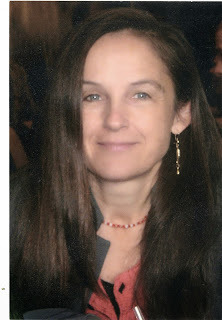I Interview Playwrights Part 608: Rosemary Moore

Rosemary Moore
Hometowns: Jersey City NJ, Indianapolis and Washington D.C.
Current Town: I live in Brooklyn, New York
Q: Tell me about your upcoming show.
A: My play SIDE STREET, directed by Ian Morgan, is running now through October 12th at THEATERLAB. Tuesday through Sunday. We are sold out but DO have a waiting list. sidestreettheplay@gmail.com
remaining shows
Tuesday, October 8th at 8pm
Wednesday, October 9th at 8pm
Thursday, October 10th at 8pm
Friday, October 11th at 8pm
Saturday, October 12th at 8pm
In the bewitched parallel universe of my play SIDE STREET, the main character, 48 year old Meg, encounters her long dead mother, Dora, very much alive and on her way into the Upper East Side apartment building where Dora now lives. During their afternoon together in her mother’s apartment, apparently frozen in time, Meg witnesses her mother’s love affair with a Navy lieutenant, which occurred many years earlier, when Meg’s father was in the Marines, fighting in World War Two. As Meg nurses her dying mother for the second time, she discovers her own mortality and her capacity for forgiveness, coming of age at last in middle age.
This production of SIDE STREET at THEATERLAB is one of simplicity and intimacy. By the light of a couple of table lamps, a 22 person audience witnesses Meg and Dora’s strange and dreamlike afternoon together, sitting close enough to touch the fading chintz slipcover on the sofa and hear the sound of the martini being prepared in the cocktail shaker.
Q: What else are you working on now?
A: Since I am playwright and producer of this production of SIDE STREET, at this moment, I am not able to do anything else! But soon I will be working to complete my play, Opium Wars; the bar play which takes place during one night in the 1840's when Talon, a sailor in flight from forced labor on a ship docked in New York, time travels forward to 1980, breaking through a brick wall into Maximus, an artist bar on Duane Street in Tribeca NYC. Ivy, Kitten, Pencil, and Informer all fall in love with Talon, who is only in love with opium. How does the sailor’s near slavery and opium addiction transform these ambitious artists and buzzing art flies’ view of themselves?
Q: Tell me, if you will, a story from your childhood that explains who you are as a writer or as a person.
A: My childhood story is about something I yelled to strangers when I was about three or four years old. I passed the time at the back window of our row house in Jersey City NJ watching the neighbors in their backyards, gardening, hanging their laundry on the clotheslines or just sitting enjoying the outdoors. I would lean out the window and try to converse with them. They were not very talkative. One day I got frustrated and yelled “Hey, you old rosebushers, the cat got your tongue?”
Q: If you could change one thing about theater, what would it be?
A: I wish theater tickets were not so expensive.
Q: Who are or were your theatrical heroes?
A: Thornton Wilder, Adrienne Kennedy, Tennessee Williams, Chekov, Harold Pinter, Maria Irene Fornes, Tony Kushner, August Wilson, Vaclav Havel.
Q: What kind of theater excites you?
A: I prefer to watch an original, interesting play with flaws, over a “well made” play with all the conventional ingredients. I like political theater when it’s done well.
Q: What advice do you have for playwrights just starting out?
A: Keep an active relationship with other playwrights.
Don’t be afraid to take a break from a play.
Go to the edge.
Writing is a process and your writing might be horrible or beautiful at first but the rule is: many many drafts will be what makes your play good.
Take a class.
Teach a class.
Go to art museums.
Sit in a public place and listen and write down dialogue exactly as you hear it.
Don’t worry if a play doesn’t make sense at first.
When you are writing yet another draft of a play pick one thing to work on as a way to trick yourself into beginning this new draft.
Show your work to dozens of people. Your work will click with someone. Collect rejections proudly!
Make sure to have some sort of production early on, even if it’s one you put on. A play still on paper will only get you so far in knowledge about playwriting.
Keep a journal: just a few sentences a day. Observations…details…specifics.
Join or form a writing group.
Staged Readings of work are a great thing for listening to work and trying different types of actors for your characters. You will discover things. Have a man read a woman’s part, for instance!
You will get better at writing gradually. Don’t watch yourself. It adds up slowly…when you least expect it.
Use the buddy system. Find another writer with whom you can honestly share the joys and hardships of the writing life.
Q: Plugs, please:
A: Go to my website.
Rosemarymoore.me
Enter Your Email To Have New Blog Posts Sent To You
Support The Blog Or Support The Art

Mailing list to be invited to readings, productions, and events
Email:
Books by Adam







Published on October 07, 2013 21:27
No comments have been added yet.



